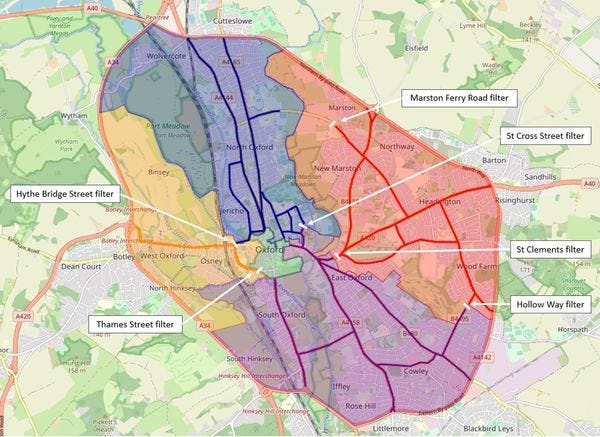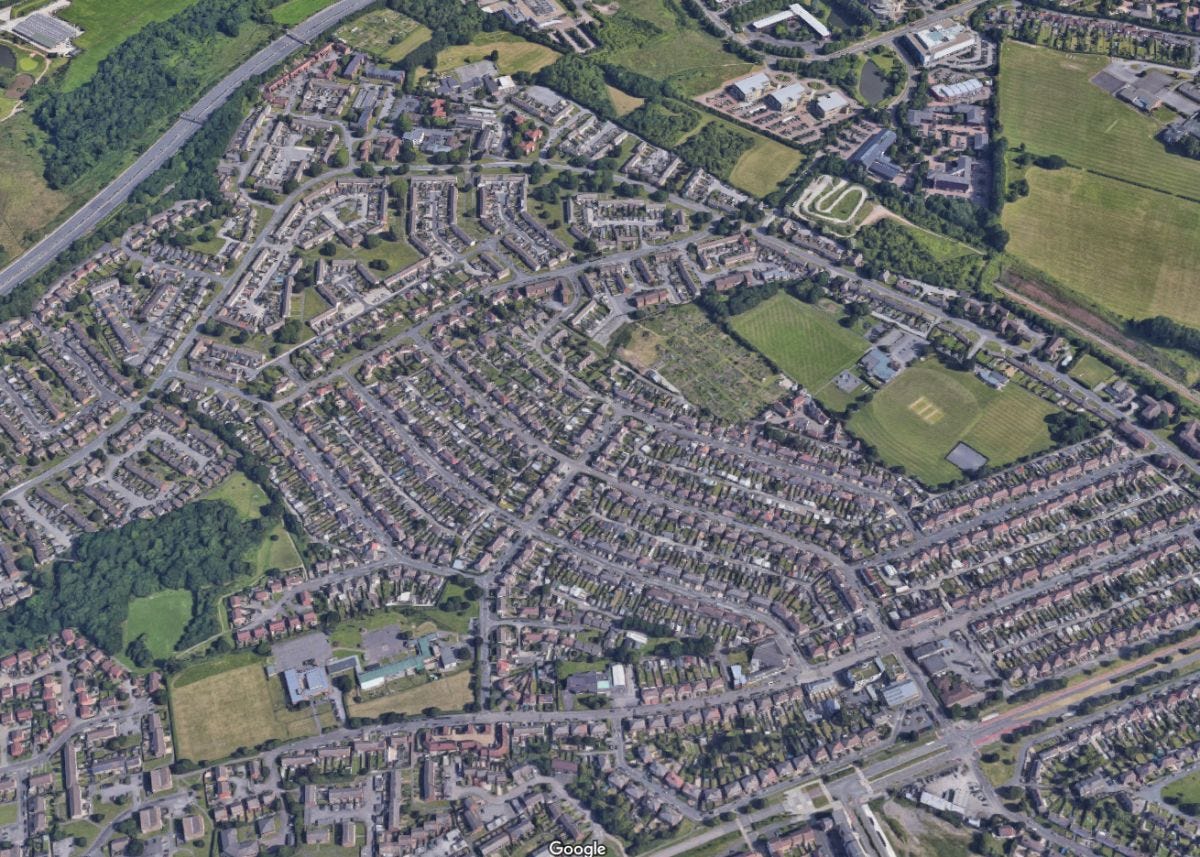More thoughts on fifteen minute neighbourhoods...
We’re writing about these schemes from a perspective of being non-drivers and actually liking the idea of having as many of the amenities of life as possible within a fifteen minute walk of where we live, we object to the way local authorities want to impose fifteen minute neighbourhoods on the residents they're supposed to be serving. Taking these factors into consideration means that our takes on the issues involved are different to those promoting the implementation of the concept and also, to those rightly objecting to it. We're fine with that because what we're trying to do is inject a bit of nuance into what is becoming a very controversial and emotive issue.
15 minute neighbourhoods won't solve the problems caused by decades of flawed planning policies and poor public transport
For decades, planning policy has assumed near universal car ownership and has allowed development to proceed accordingly. Which is why our towns and cities are surrounded by swathes of suburban housing where car ownership is pretty much essential if people are going to be able to lead any kind of a full life. As we've mentioned previously with our non-driver hats on, when we were looking for a place to move to in or near to Bristol, the criteria we had for accessibility such as being able to walk to the shops and have easy access to public transport and open spaces, ruled out many swathes of tract housing. Without giving too much personal information away, we ended up with a place in Keynsham within easy walking distance of the high street shops and cafes, public transport and open countryside. In effect, we found our own fifteen minute neighbourhood.
Given that many locations don't have shops, links to public transport and open spaces within easy walking distance, we totally understand why people drive. Unlike a number of our former comrades and allies, we don't judge people for owning cars and driving. What also has to be taken into consideration is travelling to work. Given the nature of what the majority of people do for a living, many of them still have to travel to and from a workplace. Working from home may well be a permanent shift for some after the Covid lockdowns but many jobs still require a physical presence on premises. Given how shite public transport is down here in the West Country, most of those journeys to and from work have to be made by car. There's also the fact that a fair few people work anti-social shifts which start and end when public transport is minimal or non-existent. There's also caring responsibilities for vulnerable relatives. That will often involve having to get to a different village, suburb or town. Say for example, someone in Keynsham has a caring responsibility for a relative living in Whitchurch. They're only a few miles apart as the crow flies but, given that the bus service between the two settlements is non-existent, the only option is to drive. We could cite many more examples but, as most of our readers live in and have to deal with the real world, they'll have plenty of their own!
Then there's visiting friends and relatives. As well as that, there's travelling for leisure. While public transport can do some of the heavy lifting for that, it can't do all of it. If you have friends or relatives who live in a suburb on the other side of town from where you live that cannot easily be reached by bus or train, what are you supposed to do? Are people seriously going to be expected to cut back on socialising to avoid being penalised for making too many of the 'wrong type' of journeys? If there's only one leisure centre in a town which for people living in some suburbs is not easily reached by public transport, are they supposed to just give up on activities such as swimming and the like?
Hypocrisy and being set up to fail
At this point, we feel obliged to point out there are people who are very happy to flaunt their green credentials while promoting schemes which on close examination, turn out to be traffic generators. One example being the proposed relocation of Forest Green Rovers FC to an out of town stadium right by the M5 motorway and the other being the provision of of out of town allotments by Roots, a commercial allotment provider. When even those who think they're green are promoting developments that will generate traffic, are ordinary people seriously going to be expected to restrict their lives because there are limits on the number and type of journeys they can make?
As mentioned previously, after decades of allowing towns and cities to spawn suburbs where car ownership is not only assumed but is a necessity, it's a bit rich for local authorities to turn around and start imposing restrictions on how people move around and between various areas. Bear in mind we're talking about the self same authorities, often in thrall to the developers, who have happily presided over the growth of suburbs that pretty much require car ownership. Rather than admitting that decades of planning policy have been wrong and setting about the task of re-thinking our suburbs, towns and cities so that the amenities of life end up being closer to hand, they instead set out to penalise people who have no option but to drive. To add insult to injury, to the north of Bristol, up to 6,700 homes could be built with the public transport infrastructure not only lagging way behind but, when it eventually gets built, it won't have the capacity to serve the new population.
Given all of this, for local authorities to impose fifteen minute neighbourhoods and penalise people who make more than the number of permitted journeys between and outside the zones is a flaming nerve! It's penalising people for the mistakes of decades of planning policies that these local authorities implemented. It hardly comes as a surprise that there's a lot of opposition to the implementation of fifteen minute neighbourhoods. That's because people feel they're being imposed upon them without any meaningful consultation, let alone any understanding of the reality they face and why they have to make the car journeys they do. In effect, it's blaming people for the consequences of decades of planning policies that they had no say in.
There's a need for joined up, holistic thinking...
You would like to think that the local authorities pushing these schemes would pause, take a few steps back and think about how planning policy could be altered so that more of the amenities people need are actually within walking distance. Mind you, that would involve joined up, holistic, long term thinking and from our years of experience of watching local authorities at work, we're not entirely sure they're capable of that. You would also like them to think about why people have to make car journeys and do what they can to ensure that where possible, there's a viable public transport alternative for people. However, alongside of that, it means recognising there are many reasons why people have no other option than to use a car. One group being those with caring responsibilities where those they care for are unable to use public transport but need to get to the doctors or to hospital.
Is this really about saving the environment or is there an agenda of social control at work here?
If fifteen minute neighbourhoods are implemented, they will require a lot of tracking and monitoring technology to make sure people are complying with the limits being imposed upon them and to penalise them when those limits are breached. Many of us suspect that the implementation of fifteen minute neighbourhoods is being used to piggy back a lot more in the way of technological surveillance and control upon us. It would certainly be the justification needed to bring in some form of a social credit system where there are 'rewards' for limiting your movement. All part of the Great Reset that we and many others have been warning people about for some time.
Given the level of compliance with the measures that were imposed at the start of the Covid crisis, those who presume to rule over us may be thinking they can get away with imposing the restrictions that would be an inevitable consequence of the implementation of fifteen minute neighbourhoods. While someone who is self employed and drives a van may possibly have complied with the Covid restrictions in the early part of 2020, it would be naïve to expect them to do the same with the imposition of restrictions as part and parcel of fifteen minute neighbourhoods. It has been argued that the imposition of the Covid restrictions was an experiment in seeing what level of control over their lives people were prepared to accept for the 'greater good'. What people were prepared to accept back in the spring of 2020 when the fear mongering was at fever pitch compared to now when there's a lot of quiet examination of positions and a growing level of questioning are two very different things. If the authorities think they can impose the implementation of fifteen minute neighbourhoods and expect that people will comply in the same way as they did with the Covid restrictions back in the spring of 2020, they're in for a bit of a surprise!
So, where do we stand on the implementation of fifteen minute neighbourhoods?
As non drivers who want the amenities of life within a fifteen minute walk, we should be in favour of the concept. However, when fifteen minute neighbourhoods are being imposed so authorities can be seen to be 'doing something' while ignoring the consequences of decades of planning policy assuming near universal car ownership, it would be negligent of us to not ask some searching questions as to what the real agenda is. Given that more surveillance and monitoring technology is going to be installed to facilitate the concept, as instinctive anti-authoritarians, we have to take a stand against the implementation of fifteen minute neighbourhoods. So, as with our stance against the Covid restrictions, we find ourselves with some strange political bedfellows in the fight against schemes which will subject us to a lot more in the way of surveillance and tracking and are a gateway to the imposition of social credits.
However, as non drivers, we may also end up at odds with some of our new found allies because we can see the merits of living in a neighbourhood where a fair amount of life's amenities are within walking distance. A caveat - that ease of access should never come with a price tag of people having their movements monitored, restricted and controlled. Having stated this, we also recognise that at some point in the future, when the oil does eventually start to run out along with the resources needed for a hyper-mobile society, we do need to reconfigure how and where we live. However, the process of doing that has to come from the base and be led by the people, not imposed from the top down. All of this leaves us in a position that could be seen as being at odds with both camps. So be it, we've always preferred thinking for ourselves...










